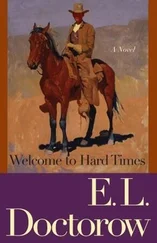Passers-by stopped to admire the baby. We could not resist the social demands of the situation. Sandy was soon talking away, introducing us in our prematurely married state. Everyone else in the car, and in the car ahead of it and the car behind, was from the same town in Illinois. They were members of a Pentecostal church. A man told us they were moving to California to set up a new community on donated land south of Los Angeles. “Yes, thank Jesus Christ our Lord,” he said. “We shall take ourselves into the Pacific and be baptized in the waters of His ocean.” The idea so overwhelmed him that he broke into song. Soon everyone in the car was singing and clapping hands. Sandy smiled at me in the excitement of the moment, she was thrilled.
By evening I believed I had heard every number in the repertoire. They were good generous people if you didn’t mind their conviction. After Sandy fell asleep across our seat they covered her with their blankets. An older woman happily shushed Baby Sandy to sleep in her arms.
I stood between the cars and smoked my cigarettes. This train was no Chief, it made frequent stops, and each time I got off to look around. As the night wore on, the train lingered at each stop although no one got on or off and only a sack or two was flung aboard the mail car. At one station, a small town in the desert, I thought I smelled something different in the air, like a warmer breeze or another land. It was very late. All the pilgrims on the train were asleep. Steam drifted back from the engine. I felt strange, as if coming out of shock. I felt as if I knew no one on earth.
I wondered if this wasn’t really the last stop, if California was like heaven, unproven. In this flatland of grit and rubble, you might sense the barest whiff of it in the air or intimation in the light of the sky — but this was as far as you got.
I wandered to the rear to the end of the platform. I picked up a folded newspaper from a Railway Express baggage cart — the rotogravure section of a Sunday paper a week or two old. I looked at the pictures. I was looking at Lucinda Bailey Bennett the famous aviatrix, two whole pages of her at various times of her life. She stood beside different airplanes or sat in their cockpits. A separate ruled column listed her speed and endurance records by date. At the bottom right-hand page of the story she was shown under the wing of a big two-engine seaplane. She was waving at the camera. The caption said: HER LAST FLIGHT. Behind her, climbing into the cabin, was a large man, broad of beam, unidentified.
I turned back and found the beginning of the feature: Lucinda Bennett’s plane The Loon had been given up for lost over the Pacific somewhere between Hawaii and Japan. F. W. Bennett was quoted as saying that if his wife had to die, surely this was the way she would prefer, at the controls of her machine, flying toward some great personal ideal.
Images of falling through space through sky through dreams
through floor downstairs down well down hole downpour.
Birds that fall into the sea as a matter of lifestyle include
kingfishers canvasbacks gulls heron osprey pipers tweaks.
Birds that fall most prominently into fresh water are loons
a type of grebe. Sixteen lakes in the Adirondack Mountains
named Loon Lake. The cry of loons once heard is not forgotten.
Clara has time to think, the space to realize her thinking mind. Never in her life has her life been so uncrowded, something she never before realized consciously how crowded her life was how people from her infancy had always been in her eyes, how the sounds of them had always been in her ears, how their presence moved in her their wills directed her even insofar as she created opposition she had been crowded by them their wills their voices their appearance directing her their cars and trucks the rumble of the elated horns horses pulling wagons splatting dung in the street, peddlers pushing their carts the stone blasting out of the rock of Manhattan tying in the girders with rivets, slapping in the stone, every manner of machine whining growling rumbling roaring in its own pitch, and all the gangsters of menace all the pain, others and her own, and the sound of fear in her, her own fear which she hated most of all because it was the loudest noise in the universe, the nuns at their prayers, kids shouting down the street, the muttering of murderous intention, and every square inch of space in her eyes blocked out by stone and tar and moving metal, by dark stairs and painted apartment walls, by overstuffed furniture by cots and pots and sinks and roaches and tin plates and later by phony butlers and the pretensions of the earth’s scum, there was nothing left in her eyes for a bee gravid with being bending a flower to the earth, or for simple blue skycolor unpenetrated by the spires of skyscrapers, or for something small and lovely to be contemplated for its own seriousness, like a comb or a hand mirror or a goldfish in a bowl, there was no chance, nothing reflected, nothing gave back from the contemplation of it, even her dreams were pure shit they did nothing for her, they were her days all over again, filled with the same people the same things in different arrangements or proportions but the same the same. So she stands quietly after some days molecularly reassembled widely spaced in her own density and watches through some branches and some leaves which have interest in themselves and pay her for the most marginal attention as she watches between them the lake water flung like a cast of silver grain in the gray day, two wakes widening behind the pontoons of the airplane finally losing the chase like porpoises turning back underwater as the green-and-white plane exchanges one environment for another and rising slowly turns, twists in the air rising turning its wings concentrating to a point then flaring out the plane falling swiftly away into the sky losing its color finally its shape and becoming possibly a speck of dust in her eye and when she blinks it is gone altogether, made of cloud made of sky gone even the sound of it gone, and she stares at the silver-scattered lake, the green leaves at her eyes, the branches and the big important journey of the ant along the twig.
So she’s alone with him at Loon Lake and finds that still there is no intimacy and the mysteriousness of this fact begins to interest her. This is the way the rich do things. Getting herself dressed, she marches downstairs defiantly accepting it all and sits down for breakfast on the terrace overlooking the lake and waiting till they came out to see what she wants and eating a half grapefruit sitting in its silver shell in ice and daring anyone Bennett included to look at her the wrong way.
But nothing has happened, the schedule is unaltered, the drinks at certain hours, the meals at certain hours, the morning a certain time in a certain place, the afternoon and evenings all timed, the past between them unacknowledged, the past ignored, personal reactions forsworn, you-naughty-girl forborne, every breath in its good time and Bennett keeps his distance with the utmost courtesy and only sees her at the times planned for seeing, at table, or on the tennis court her lesson or riding on the trail and she is left alone at her wish and settled into the timed ordered planned encounters of the rich in their family life who dole out time in carefully measured amounts to each other, they even sleep in separate rooms so as not to wear out their lives on each other, so as to avoid anything like the fluid mess of most people’s lives, and those who are closest to each other are as timed to be apart as anyone else. So at last she understands what wealth is, the desire for isolation, its greatest achievement is isolation, its godliness is in its isolation and that’s why never in her life before, her days and nights of time, has she enlarged this way, has her mind enlarged to the space this way, and has this voice been heard this way in reflection of herself. And the point is that she is growing to the environment, beginning to match it, and it is all beginning to make proportional sense, the timed encounters, the ceremony of courteous meetings, the space between people sharing space, the great distance to be traveled even in an obvious situation like this, so crudely obvious as to outcome, the aloneness of the two of them now, not the ironic wife not the fat poet sharing the fifty thousand acres, even now the isolated distance will have to be traveled before he can allow himself to put his hands on her. And that makes her smile. Because now she will know when that time is too, it will match her awareness and nothing will shock her or surprise her because the distance he must travel is the function of his wealth, as separative as it is powerful, and she waits in grim amusement knowing that by the time something happens he will have become recognizable to her, her familiar, and their intimacy will be all that’s possible for her, so natural she will wonder what it ever was that enraged her when her gangster left her sleeping and took the private train.
Читать дальше











